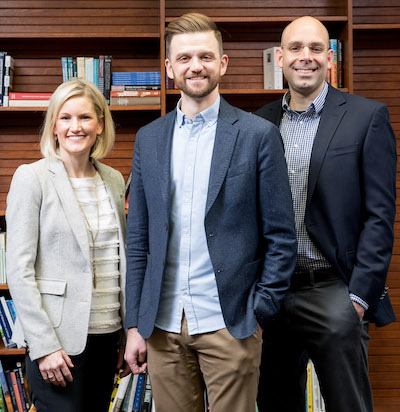It wasn’t long ago when the concept that schools should play a role in supporting a child’s mental health was met with skepticism.

the School Mental Health Collaborative.
“Historically, schools have not been seen as having a major role to play,” says Stephen Kilgus, an associate professor with the School of Education’s Department of Educational Psychology. “Ten years ago, we could occasionally convince administrators or teachers that part of their role was to promote a child’s social and emotional well-being.”
But today, notes Kilgus, “I think we’ve gotten to the point where it’s increasingly recognized as a core part of the mission of education.”
With efforts centered on conducting research that informs policy and practice related to the social-emotional and behavioral success of all students, Kilgus and colleagues Katie Eklund and Andy Garbacz have launched the School Mental Health Collaborative.
While all three are faculty members with the Department of Educational Psychology’s school psychology program, each brings a different lens from which to view this realm. Much of Kilgus’ work centers on studying and validating social-emotional and behavioral assessment, while Eklund — who worked in public education for 10 years as a school administrator, psychologist, and social worker — focuses on policy and practice issues related to school mental health identification and interventions, in addition to school climate and safety. Garbacz’s work emphasizes building, testing, and scaling programs that interconnect school, home, and community systems to promote mental health.
“Although we each come to this work from various experiences and with diverse perspectives on research and practice, it makes our work better,” says Eklund.
The School Mental Health Collaborative also is an outstanding training ground for 25 graduate students, many of whom are provided funding and gain experience as researchers and school psychologists.
With research suggesting one-in-five youth will experience mental health concerns, there is a persistent need for research-based tools, resources, and guidance that can effectively help educators and parents promote the mental health of young people. Currently, the collaborative is in the midst of 12 research projects.
Over the summer, the researchers were awarded two major grants via the U.S. Department of Education’s Institute of Education Sciences (IES) to examine brief mental health interventions that are designed for use in schools.
One is worth $1.38 million and will support the continued development of the Resilience Education Program (REP), which is a small-group intervention for fourth- through eighth-grade students at risk for depression and anxiety. This program will be tested across multiple school districts in Wisconsin. Kilgus is the principal investigator (PI), Eklund is co-PI, and Garbacz is a co-investigator. The team also includes colleagues from the University of Missouri.
The other project is worth $3.27 million and will examine the efficacy of Check In/Check Out (CICO) at the elementary school level. CICO is an intervention designed to provide positive reinforcement via an adult mentor to students who commonly display disruptive or off-task behaviors. It will be evaluated in urban, suburban, and rural schools in Missouri, Kansas, and Wisconsin. This grant was awarded to UW–Madison, with Kilgus and Eklund as co-principal investigators. The University of Missouri’s Tim Lewis is the PI, while the University of Kansas’ Howard Wills is a co-PI.
“Our collaborative and the work we are doing is a dream and the reason I got into psychology,” says Garbacz. “Together, it’s our goal to effect real change and help children and families in our com- munity and across the nation experience more positive outcomes.”